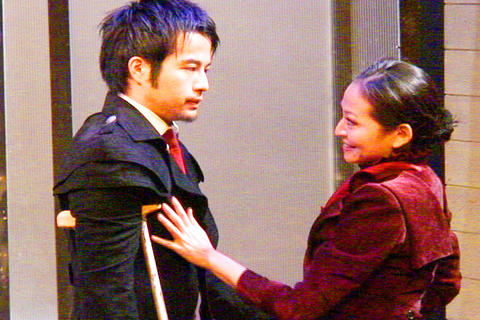Sunday morning finds a pistol-waving Macbeth screaming at the actors assembled in the middle of the rehearsal space. The rehearsal ends - like the play itself - with Macduff removing a gun from under his suit and shooting a few rounds into Macbeth. who falls back and dies. Wandering into the set mid-action, one could be excused for thinking they just entered a film stage for an Elmore Leonard novel rather than the rehearsal space for a play written 400 years ago.
But contemporary elements - gun rather than sword, suit rather than tunic - pervade Tainaner Ensemble's (台南人劇團) Macbeth Unplugged (莎士比亞不插電:馬克白), the third installment in a series of plays that began with Romeo and Juliet, followed by Hamlet.
Macbeth, which begins tonight at the National Experimental Theater, takes the same approach that Tainaner Ensemble has used to great effect in previous productions. Its version of Hamlet saw the lead character using a digital camera throughout the performance, the images from which were projected onto three screens. Romeo and Julie featured a live rock and roll band.

PHOTO: COURTESY OF TAINANER eNSEMBLE
"We use these modern elements [so] the audience … doesn't think they are coming to see a foreign play or history play," said Lu Po-shen (呂柏伸), Tainaner Ensemble's artistic director. "They are coming to see a play in their own time."
Though these contemporary elements may seem a gratuitous flourish to increase ticket sales, Tainaner Ensemble does it in a way that adds impact to Shakespeare's tragedy of betrayal and hubris. The theater troupe also stays true to basics by employing a visual language to set design that harks back to Shakespeare's time when sets were relatively simple.
As with their previous efforts, Tainaner Ensemble has called upon the translating expertise of Taiwanese poet Chou Ting-bang (周定邦), who worked with many Chinese translations of the play to create the Hoklo (commonly known as Taiwanese) script. Lu says he prefers working in Taiwanese because it is closer to the musicality of the original Old English.
A Taiwanese script, however, should not dissuade non-Taiwanese speakers from watching the play as the troupe recreates the gestures - such as Lady Macbeth wringing her hands and Macbeth seeing Banquo's ghost - that are hallmarks of the original work. Having recently performed the play at the Avignon Theater Festival, Lu says that audience members had little difficulty following the plot.
Lu says he often hears criticism that Tainaner Ensemble focuses mainly on Western drama at the expense of local theater. But it is a criticism that he feels is unwarranted because the kinds of play he directs speak to humanity, rather than just one culture. He has future plans to produce plays like Twelfth Night and A Midsummer's Night Dream.
For A Midsummer's Night's Dream, Lu hopes to bring together modern and traditional actors to work with Taiwanese folk artists.

April 28 to May 4 During the Japanese colonial era, a city’s “first” high school typically served Japanese students, while Taiwanese attended the “second” high school. Only in Taichung was this reversed. That’s because when Taichung First High School opened its doors on May 1, 1915 to serve Taiwanese students who were previously barred from secondary education, it was the only high school in town. Former principal Hideo Azukisawa threatened to quit when the government in 1922 attempted to transfer the “first” designation to a new local high school for Japanese students, leading to this unusual situation. Prior to the Taichung First

The Ministry of Education last month proposed a nationwide ban on mobile devices in schools, aiming to curb concerns over student phone addiction. Under the revised regulation, which will take effect in August, teachers and schools will be required to collect mobile devices — including phones, laptops and wearables devices — for safekeeping during school hours, unless they are being used for educational purposes. For Chang Fong-ching (張鳳琴), the ban will have a positive impact. “It’s a good move,” says the professor in the department of

On April 17, Chinese Nationalist Party (KMT) Chairman Eric Chu (朱立倫) launched a bold campaign to revive and revitalize the KMT base by calling for an impromptu rally at the Taipei prosecutor’s offices to protest recent arrests of KMT recall campaigners over allegations of forgery and fraud involving signatures of dead voters. The protest had no time to apply for permits and was illegal, but that played into the sense of opposition grievance at alleged weaponization of the judiciary by the Democratic Progressive Party (DPP) to “annihilate” the opposition parties. Blamed for faltering recall campaigns and faced with a KMT chair

Article 2 of the Additional Articles of the Constitution of the Republic of China (中華民國憲法增修條文) stipulates that upon a vote of no confidence in the premier, the president can dissolve the legislature within 10 days. If the legislature is dissolved, a new legislative election must be held within 60 days, and the legislators’ terms will then be reckoned from that election. Two weeks ago Taipei Mayor Chiang Wan-an (蔣萬安) of the Chinese Nationalist Party (KMT) proposed that the legislature hold a vote of no confidence in the premier and dare the president to dissolve the legislature. The legislature is currently controlled